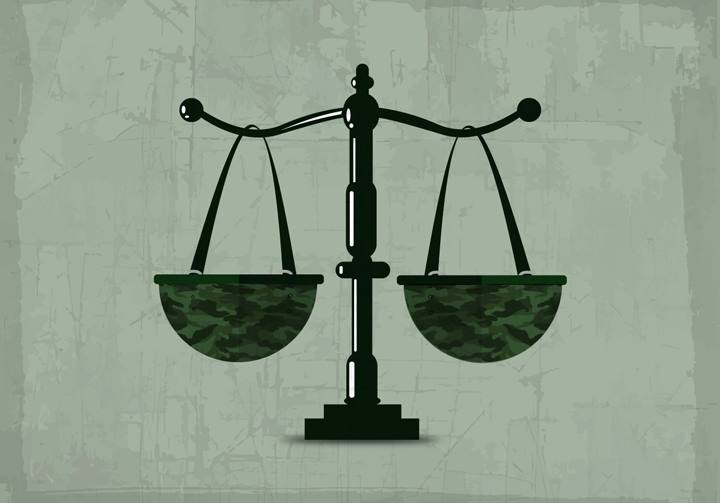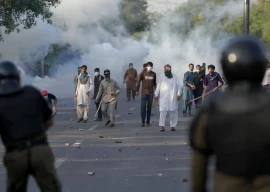
A six-judge larger bench of the Supreme Court headed by Justice Sardar Tariq Masood will hear the appeals against its earlier verdict – wherein it had unanimously declared the trial of civilians allegedly involved in the May 9 riots in military courts as unconstitutional – on Dec 15.
According to the SC roster issued on Saturday, the bench will also include Justices Aminuddin Khan, Muhammad Ali Mazhar, Hasan Azhar Rizvi, Musarrat Hilali and Irfan Saadat Khan.
On Oct 23, a five-judge bench comprising Justice Ijazul Ahsan, Justice Muneeb Akhtar, Justice Yahya Afridi, Justice Mazahir Naqvi, and Justice Ayesha Malik ordered that 103 accused in cases relating to the violence on May 9 and 10 should be tried under ordinary criminal laws.
Their verdict came on the petitions filed by former chief justice Jawwad S Khawaja, senior lawyer Aitzaz Ahsan and others, questioning the legitimacy of trying civilians in military courts.
Read SC to take up appeals against military trial verdict on Dec 13
The intra-court appeals against that verdict had been filed by the caretaker federal government and the interim set-ups in the provinces of Punjab, Balochistan, and Khyber-Pakhtunkhwa. The caretaker Sindh government refuted reports that it had challenged the judgment.
The defence ministry also filed an appeal before the SC against its verdict, requesting the top court to suspend the judgment’s operation during the pendency of its plea.
A contempt of court petition had also been filed before the SC against Defence Secretary Lt Gen (retd) Hamooduz Zaman Khan for allegedly paying no heed to its Oct 23 verdict.
The appeal filed by the interim federal government read that the incidents of May 9 involved “targeted attacks” on military installations and establishments in an “organised and coordinated manner”.
Read more Contempt sought against defence secretary
It added that the attacks were “neither localised nor isolated”. “The events [of May 9] indicate a premeditated and intentional attempt to undermine the country’s armed forces and inhibit [its] internal security,” the appeal stated.
The plea read that following the events of May 9, several FIRs were registered against the perpetrators. It continued that even though some of the FIRs did not “explicitly mention” the provisions of the Army Act, the top court had earlier held that it were the contents and not the particular statutory provision which determined the nature of the offences.
It was pointed out in the appeal that the Supreme Court (Practice and Procedure) Act had been declared ultra vires the Constitution and had taken effect since April 21. It added that in view of the act having attained constitutional validity, the constitution of the bench was in contravention to the procedure prescribed under sections 2 and 3 of the law.
“Therefore, the judgement is liable to be set aside for having been rendered coram non judice [without jurisdiction] and thus a nullity in the eye of law,” it continued. It contended that the petitions were not maintainable before the SC in its original jurisdiction under Article 184(3).
Read Aitzaz Ahsan terms military courts 'slaughterhouses'
The plea maintained that the trial of the accused persons – whether military personnel or otherwise – could not be challenged for being in violation of any of the fundamental rights, including those enshrined in articles 9, 10-A and 25 of the Constitution.
The appeal argued that the challenges raised in the petitions could have been adjudicated by the high courts in their original constitutional jurisdiction under Article 199.
It contended that the petitions fell outside the purview of “the contours that this court [SC] had determined for the exercise of its original jurisdiction”. The plea pointed out that offences under Section 2(1)(d)(ii) included those under the Official Secrets Act, which “related to works of defence or naval, military or air force affairs, which may be prejudicial safety, interest, defence, sovereignty and sanctity of Pakistan”.
“It is clear from the nature of these offences that despite being committed by person[s] who are not members of the armed forces, they are closely related to the proper discharge of duties of such members,” it added.



1722415155-0/BeFunky-collage-(18)1722415155-0-165x106.webp)
1717051338-0/BeFunky-collage-(76)1717051338-0-165x106.webp)
1732002687-0/Untitled-design-(11)1732002687-0-270x192.webp)

1732000005-0/Express-Tribune-(2)1732000005-0-270x192.webp)













COMMENTS
Comments are moderated and generally will be posted if they are on-topic and not abusive.
For more information, please see our Comments FAQ